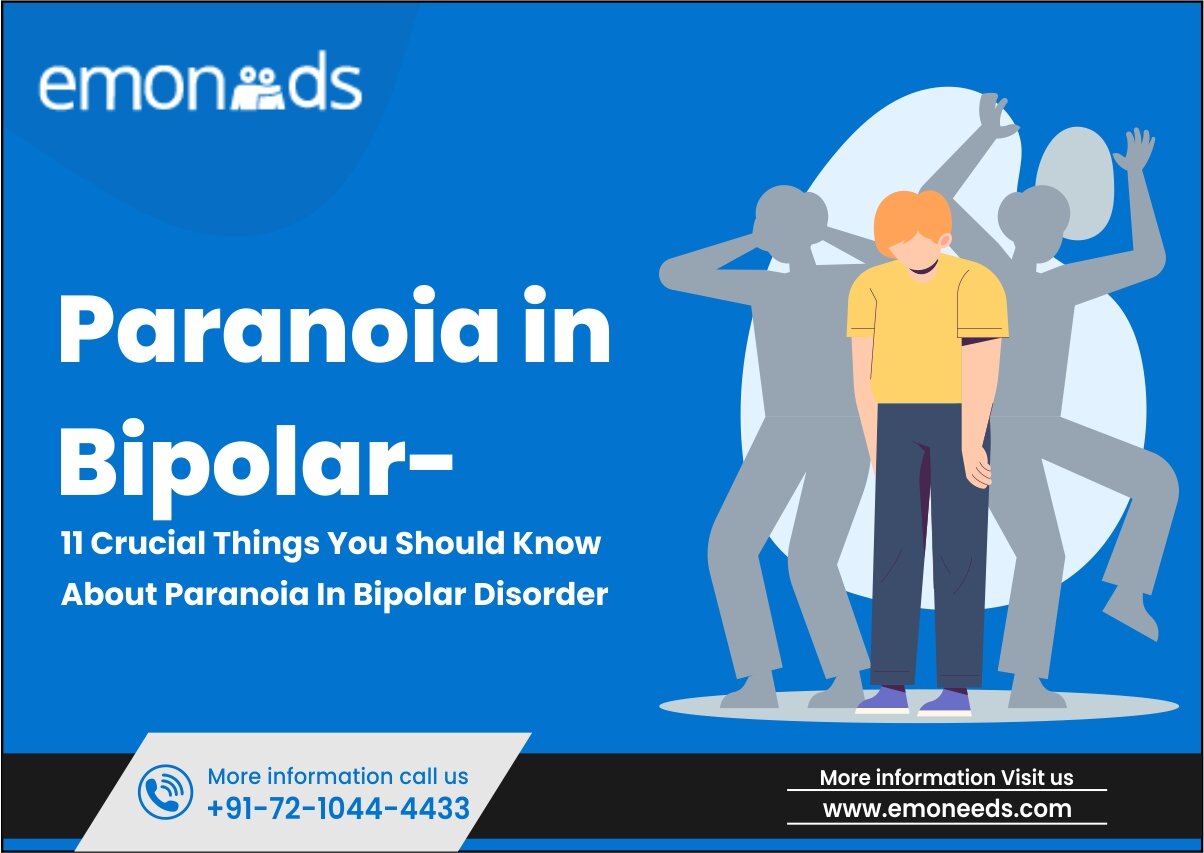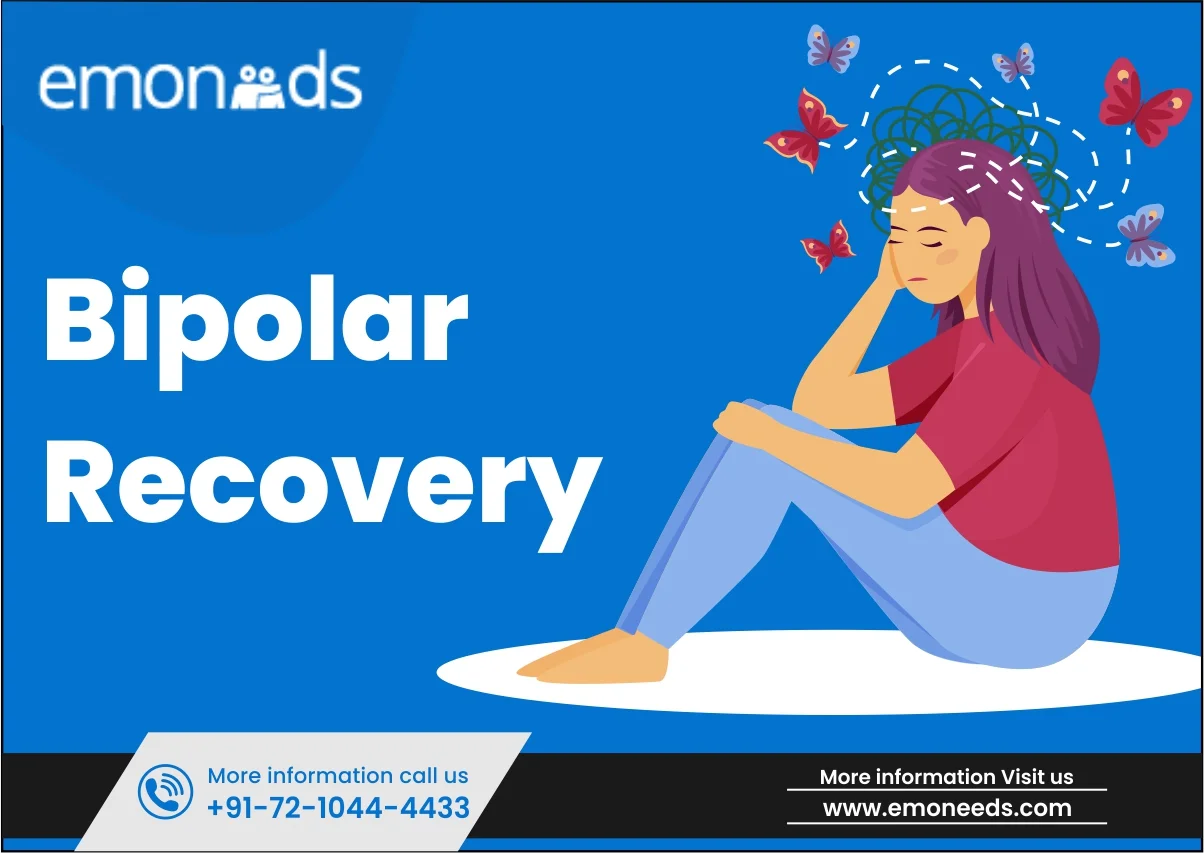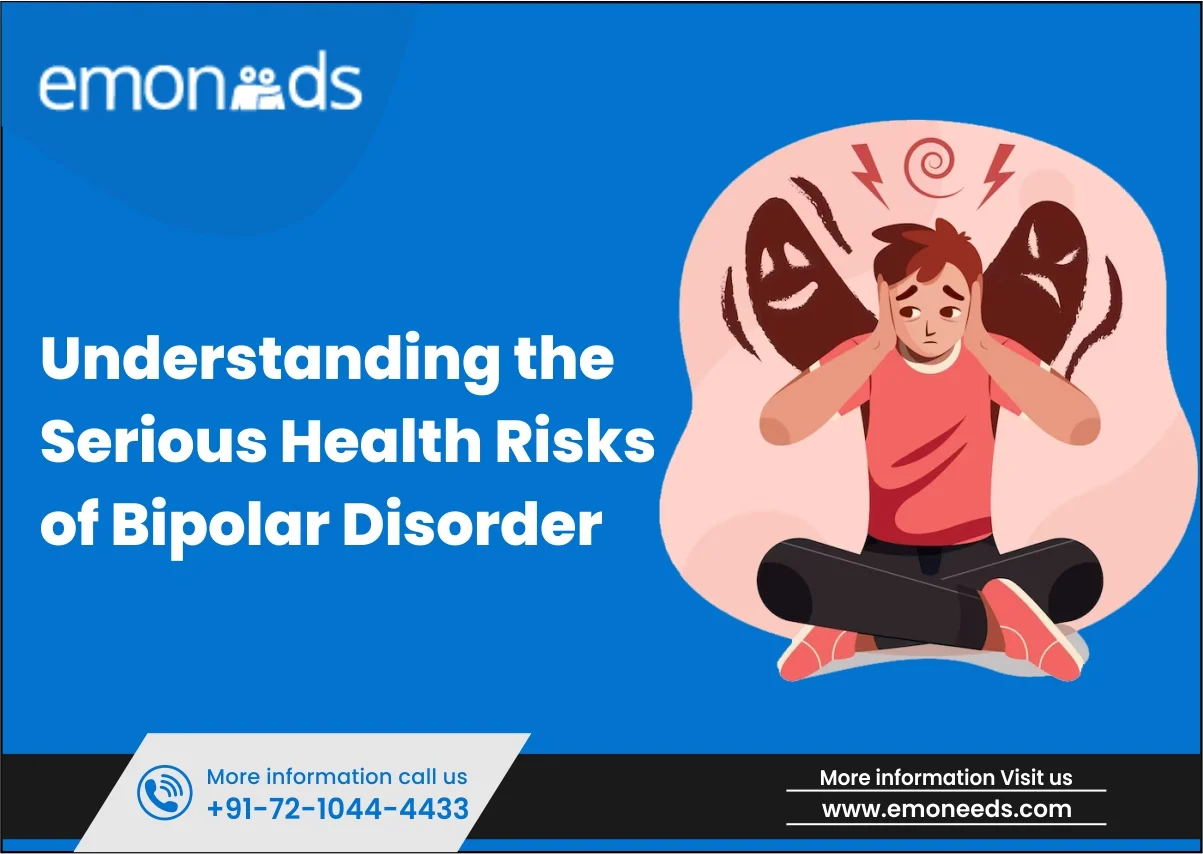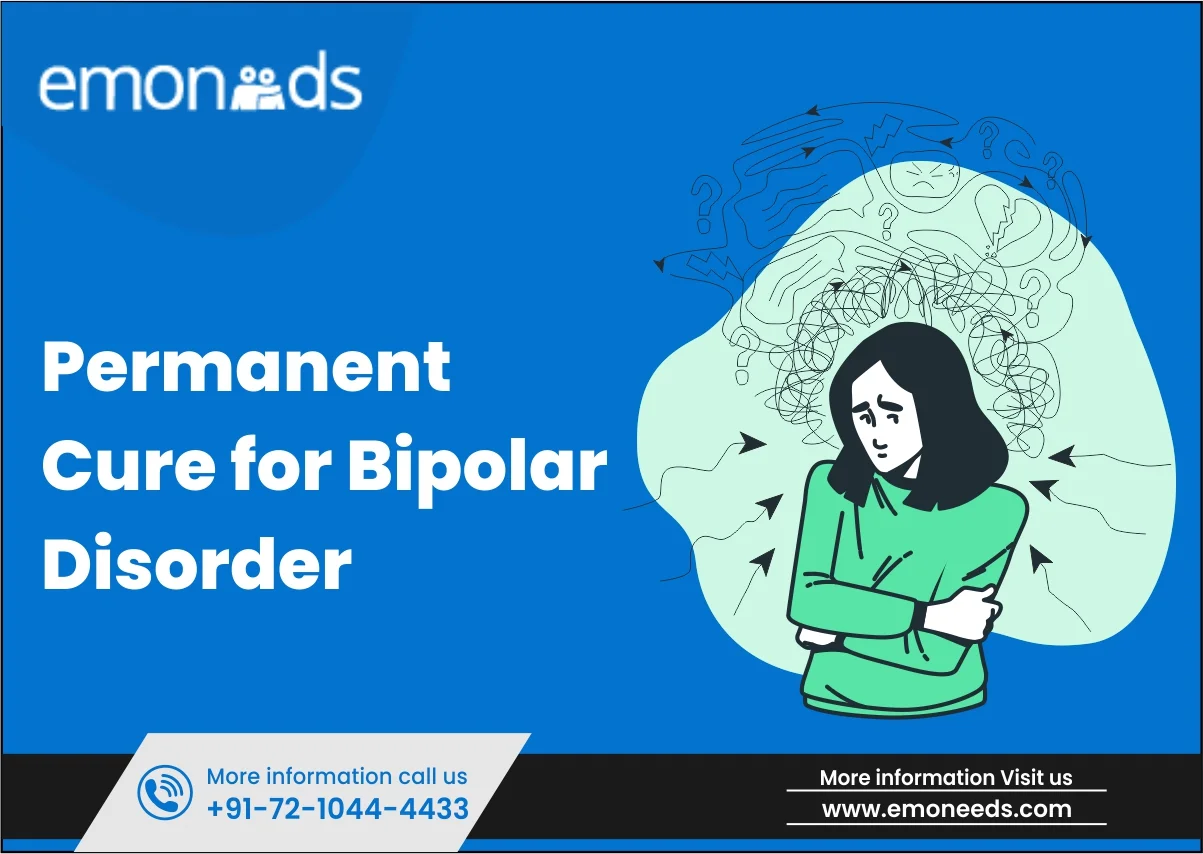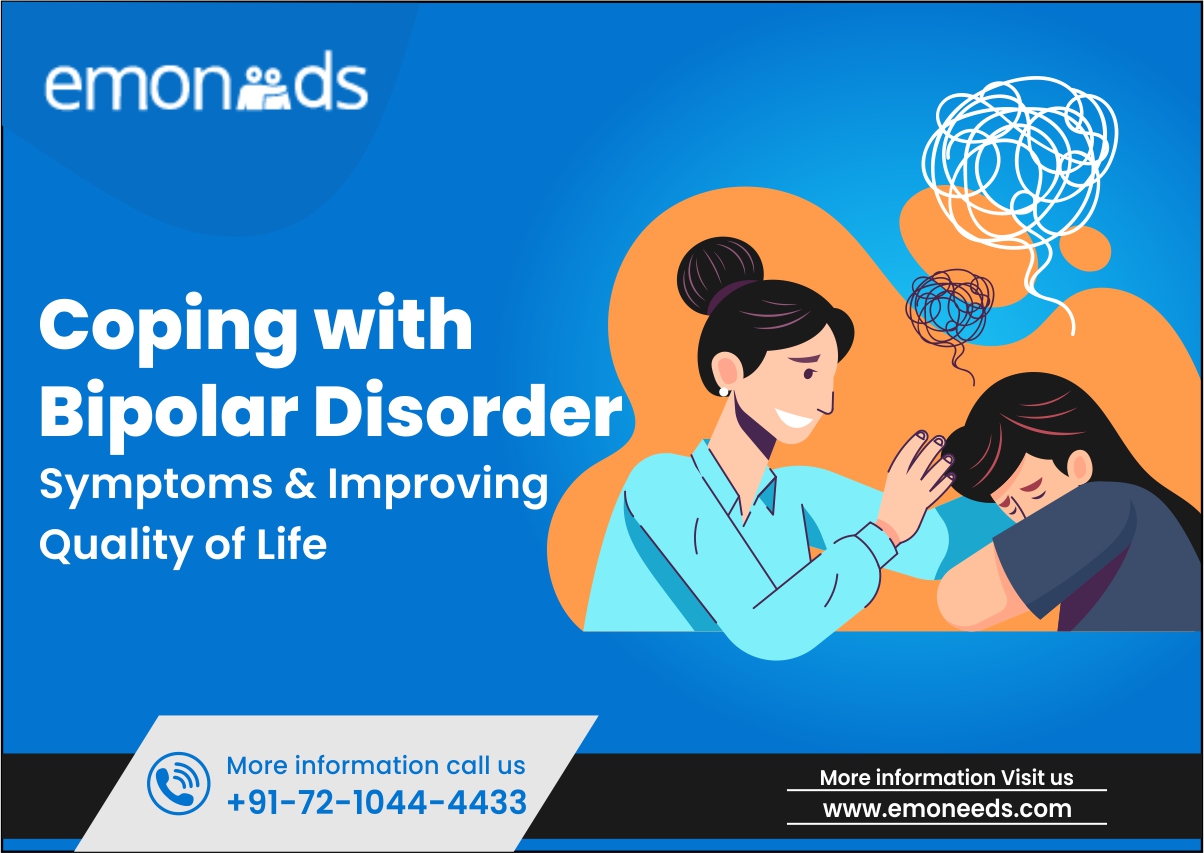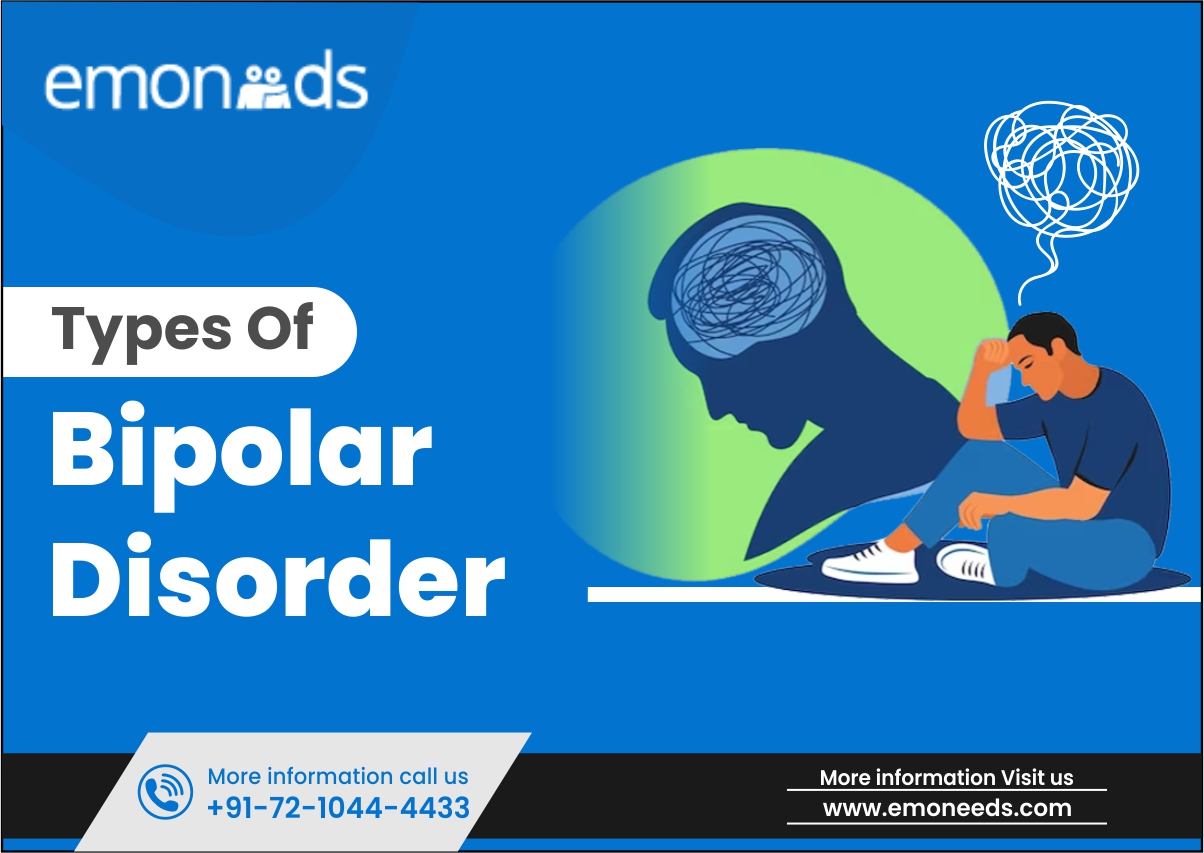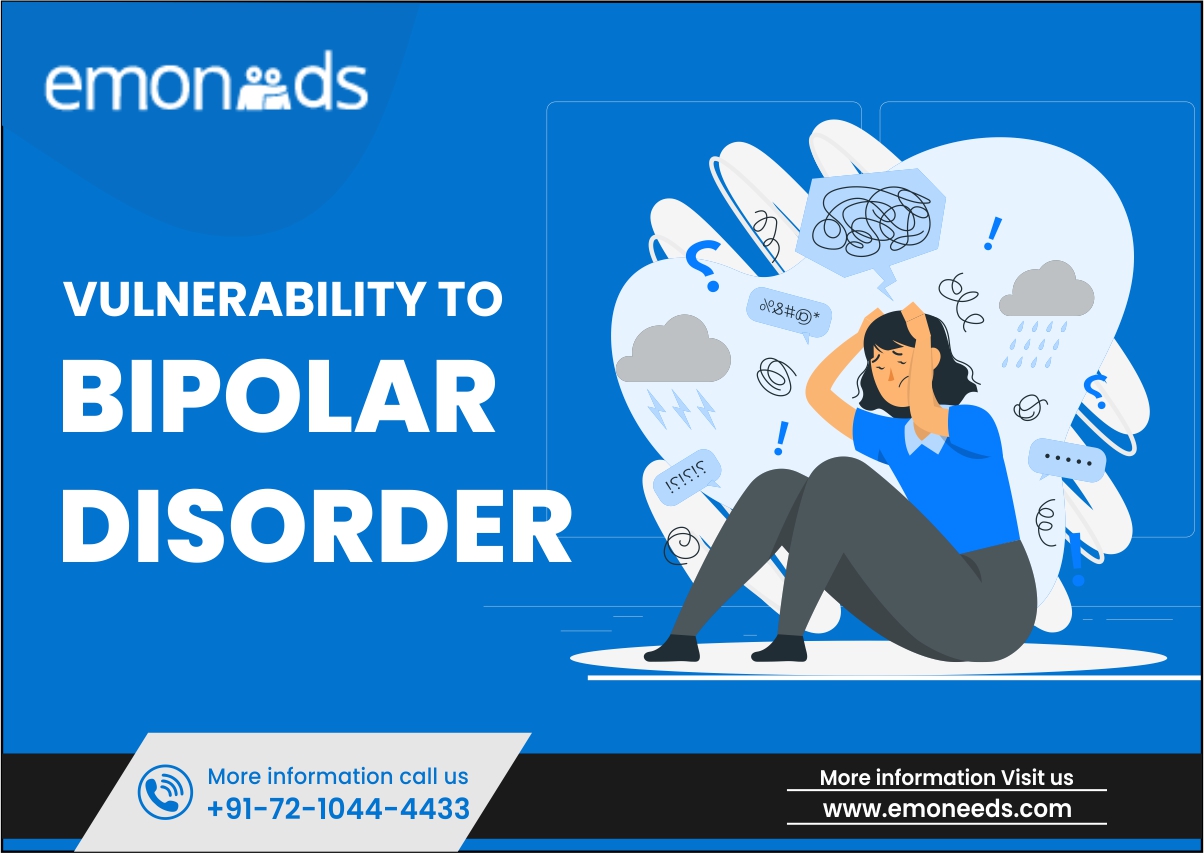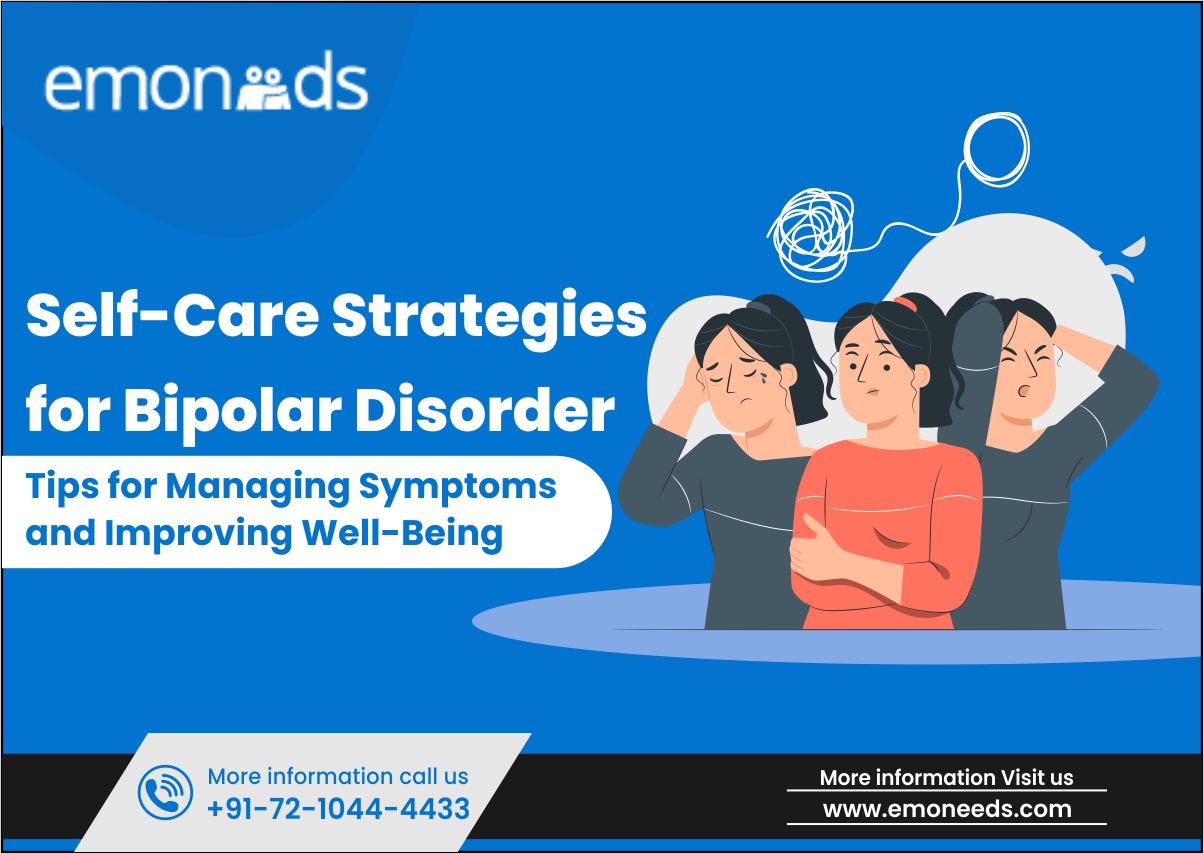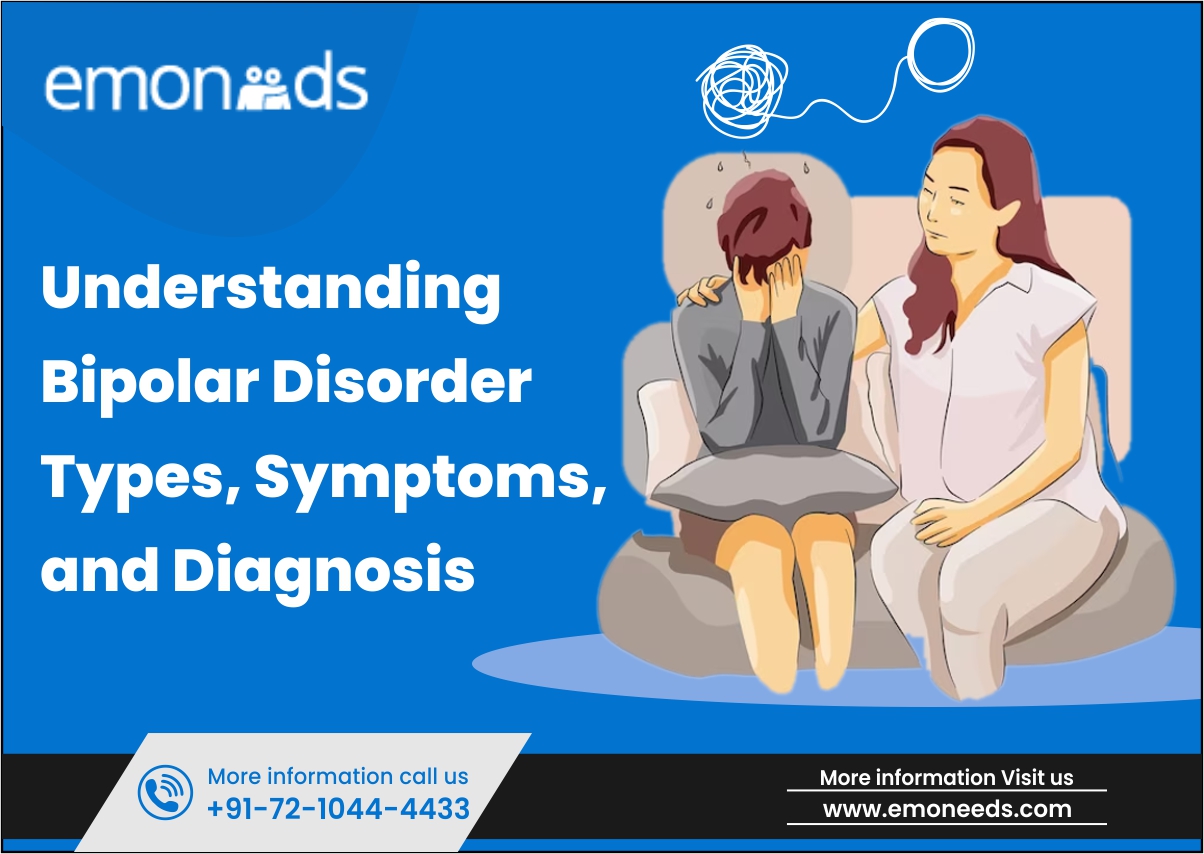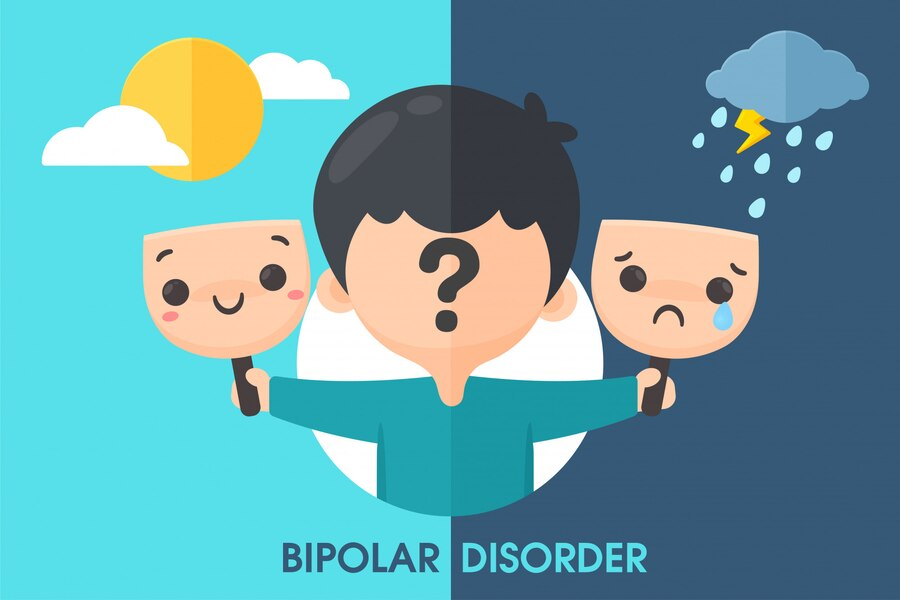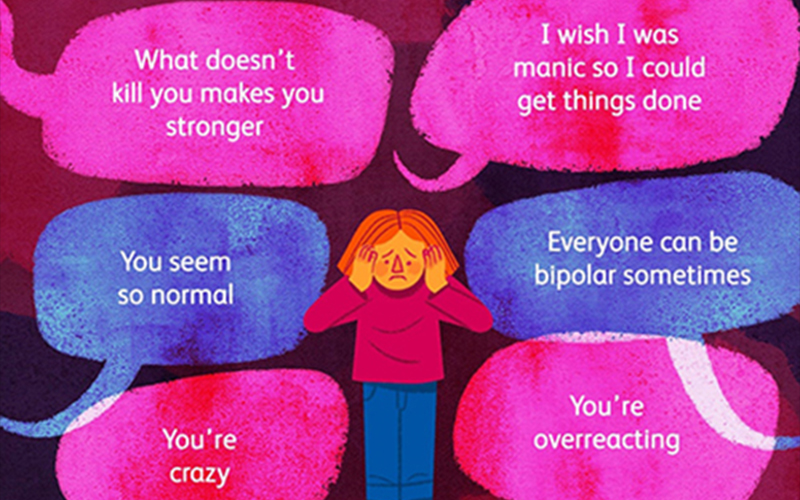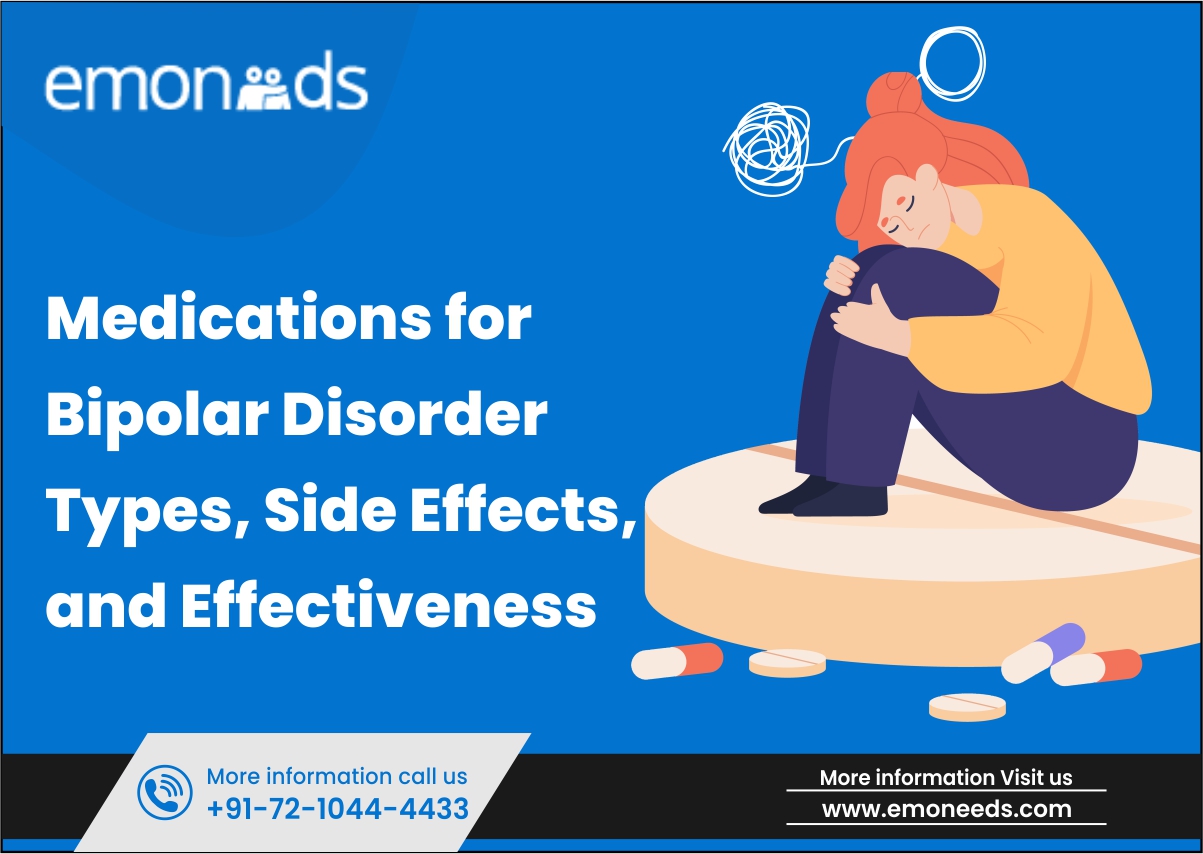
- July 14, 2023
- Saloni Kabra
- 0
Living with bipolar disorder can be a challenging journey, characterized by unpredictable mood swings that range from manic highs to depressive lows. To effectively manage this mental health condition and regain stability, medications play a crucial role. In this blog, we will delve into the world of bipolar disorder medications, exploring different types, discussing potential side effects, and examining their effectiveness in treating this complex disorder.
Table of Contents
ToggleUnderstanding Bipolar Disorder Medications
Mood Stabilizers
Mood stabilizers are a cornerstone in the treatment of bipolar disorder, playing a vital role in balancing mood fluctuations and reducing the intensity of manic episodes, as well as alleviating depressive symptoms. The following are some key points to understand about mood stabilizers
Lithium: Lithium is a well-established and widely used mood stabilizer that has shown significant efficacy in managing bipolar symptoms. It works by regulating neurotransmitter activity in the brain, helping to stabilize mood and prevent the occurrence of manic episodes. Lithium requires careful monitoring of blood levels to ensure therapeutic effectiveness and avoid toxicity.
Valproic Acid: Valproic acid, also known as divalproex sodium, is another commonly prescribed mood stabilizer. It works by increasing the levels of the neurotransmitter GABA (gamma-aminobutyric acid) in the brain, which helps to regulate mood and prevent mood swings. Valproic acid can be particularly effective in managing manic episodes and may also have some antidepressant properties.
Lamotrigine: Lamotrigine is a mood stabilizer and often a long-term treatment option for bipolar disorder. It modulates the release of glutamate, a neurotransmitter involved in mood regulation. Compared to other mood stabilizers, lamotrigine is particularly effective in preventing depressive episodes and carries a lower risk of inducing manic symptoms.
Antidepressants
Antidepressants are medications primarily used to treat depression, but their role in bipolar disorder treatment requires careful consideration due to the risk of inducing manic or hypomanic episodes. Here are some important points to understand about the use of antidepressants in bipolar disorder treatment
Adjunct to mood stabilizers In certain cases, antidepressants may be prescribed alongside mood stabilizers to address depressive episodes in bipolar individuals. This combination approach aims to effectively manage depression while minimizing the risk of inducing mania. The specific antidepressant and dosage will depend on individual factors and treatment response.
Selective serotonin reuptake inhibitors (SSRIs): SSRIs are a common class of antidepressants prescribed for bipolar depression. Examples include fluoxetine (Prozac), sertraline (Zoloft), and escitalopram (Lexapro). SSRIs work by increasing the levels of serotonin in the brain, which can help improve mood. However, their use in bipolar disorder requires close monitoring due to the potential risk of mood switching.
Serotonin-norepinephrine reuptake inhibitors (SNRIs): SNRIs are another class of antidepressants that may be considered for bipolar depression. Examples include venlafaxine (Effexor) and duloxetine (Cymbalta). SNRIs work by increasing the levels of both serotonin and norepinephrine, which can help alleviate depressive symptoms. As with SSRIs, careful monitoring is necessary when using SNRIs in bipolar disorder treatment.
Atypical antidepressants: Atypical antidepressants, such as bupropion (Wellbutrin), mirtazapine (Remeron), and trazodone (Desyrel), may also be considered for bipolar depression. Some individuals may find these medications better tolerated due to their different mechanisms of action. However, they still carry the risk of mood destabilization and should be used cautiously.
Antipsychotics
Antipsychotics are a class of medications frequently used in the treatment of bipolar disorder. These medications work by regulating the levels of dopamine and other neurotransmitters in the brain, thereby reducing psychosis, and manic symptoms, and stabilizing mood. Here are some important points to understand about antipsychotics in the context of bipolar disorder treatment
Atypical antipsychotics: Atypical antipsychotics, such as risperidone and olanzapine, are commonly prescribed for bipolar disorder. They are effective in reducing manic symptoms and preventing relapses. Atypical antipsychotics block specific dopamine receptors in the brain, helping regulate neurotransmitter activity and stabilize mood.
Typical antipsychotics: Typical antipsychotics, like haloperidol, are an older class of medications that are effective in the treatment of bipolar disorder. They work by blocking dopamine receptors in the brain, helping to reduce symptoms of psychosis and mania. However, typical antipsychotics may be associated with a higher risk of side effects compared to atypical antipsychotics.
Medication Side Effects and Management
Like any medication, bipolar disorder treatments can have side effects. It’s important to be aware of these potential side effects and discuss them with your healthcare provider. Here are some common side effects associated with different types of bipolar medications:
Mood stabilizers, such as lithium:
Weight gain: Some individuals may experience weight gain while taking mood stabilizers, particularly lithium. Lifestyle modifications and regular exercise can help manage this side effect.
Increased thirst Mood stabilizers like lithium may cause increased thirst or excessive urination. It is important to stay hydrated, and any concerns regarding hydration should be discussed with your healthcare provider.
Tremors: In some cases, tremors or shakiness of the hands may occur as a side effect of mood stabilizers. Addressing this issue can involve adjusting the dosage of the medication or exploring alternative medication options.
Antidepressants
Sexual dysfunction: Antidepressants can sometimes cause sexual side effects, such as decreased libido, difficulty achieving orgasm, or erectile dysfunction. It’s important to discuss any changes in sexual function with your healthcare provider to explore potential solutions.
Sleep disturbances: Some individuals may experience sleep disturbances, such as insomnia or vivid dreams while taking antidepressants. Adjusting the timing of medication intake or exploring adjunctive sleep aids can help manage these issues.
Gastrointestinal issues: Antidepressants can occasionally cause gastrointestinal side effects, including nausea, diarrhea, or constipation. These symptoms are typically temporary and may improve over time.
Antipsychotics
Drowsiness: Antipsychotic medications can cause drowsiness or sedation, especially when first starting treatment or when the dosage is increased. It’s important to avoid activities that require alertness until you know how the medication affects you.
Restlessness: Some individuals may experience restlessness or a feeling of inner discomfort while taking antipsychotics. This side effect is known as akathisia and can often be managed by adjusting the dosage or trying different medications.
Metabolic changes: Certain antipsychotics may lead to metabolic changes, such as weight gain, increased cholesterol levels, or insulin resistance. Regular monitoring of metabolic parameters is important. To manage these effects, healthcare providers may recommend implementing lifestyle modifications.
Strategies for Managing Side Effects
While coping with side effects can be challenging, there are strategies to mitigate their impact. By implementing these strategies, you can focus on achieving stability and optimal mental health. Let’s dive into some key strategies for managing side effects effectively.
- Maintain open communication with your healthcare team
- Promptly report any side effects experienced
- Seek guidance and adjustments to medication dosage if necessary
- Explore alternative medication options if side effects persist
- Adopt a healthy diet to support overall well-being
- Engage in regular exercise to promote physical and mental health
- Practice stress-reducing techniques, such as mindfulness or relaxation exercises
- Consider complementary therapies, such as acupuncture or yoga, to alleviate side effects
- Educate yourself about potential side effects and their management strategies
- Seek support from support groups or counseling services to cope with the emotional impact of side effects
Effectiveness of Bipolar Medications
Individual Variation
The effectiveness of bipolar medications varies from person to person. Finding the right medication and dosage often involves a trial-and-error process. It’s crucial to be patient and work closely with your healthcare team to determine the optimal treatment plan that suits your individual needs. Regular monitoring and open communication are vital to assess the medication’s effectiveness and make necessary adjustments as you progress on your journey toward stability.
Complementary Therapies
While medications are a cornerstone of bipolar disorder treatment, they are most effective when combined with complementary therapies. Psychotherapy, such as cognitive-behavioral therapy (CBT), can help individuals develop coping strategies, manage stress, and improve overall well-being. Lifestyle changes like maintaining a regular sleep schedule, practicing relaxation techniques, and building a support network of family and friends also contribute to holistic recovery.
Working with Healthcare Providers
Importance of Collaboration
Collaborating with healthcare providers is crucial for effective bipolar disorder management. Open and honest communication is key to building a trusting relationship with your healthcare team. By actively participating in your treatment plan, asking questions, and sharing your concerns, you can work together to find the most suitable medications and develop an individualized approach that best addresses your unique needs.
Regular Monitoring
Bipolar disorder is a dynamic condition that requires ongoing monitoring. Regular check-ups with your healthcare provider are essential for assessing treatment efficacy, addressing side effects, and making any necessary adjustments. Keep track of your mood changes, and communicate any shifts or concerns promptly. By actively participating in your care, you can play an active role in managing your condition and working towards long-term stability.
Conclusion
In conclusion, managing bipolar disorder requires a comprehensive approach that includes medication as a crucial component. Mood stabilizers, antidepressants, and antipsychotics are commonly prescribed to address bipolar symptoms. While each medication may have its side effects, strategies for managing them exist. Open communication with your healthcare team is essential for making informed decisions about your treatment plan.
At Emoneeds, we understand the complexities of bipolar disorder and the importance of personalized care. Our experienced team of professionals provides a holistic approach to mental health, offering various services including therapy, cognitive rehabilitation, social skills therapy, and medication management. With a focus on individualized treatment plans and ongoing support, we strive to help you regain control over your life and embrace a brighter, more stable future.
Connect with Emoneeds today and take the first step towards managing your bipolar disorder effectively.
